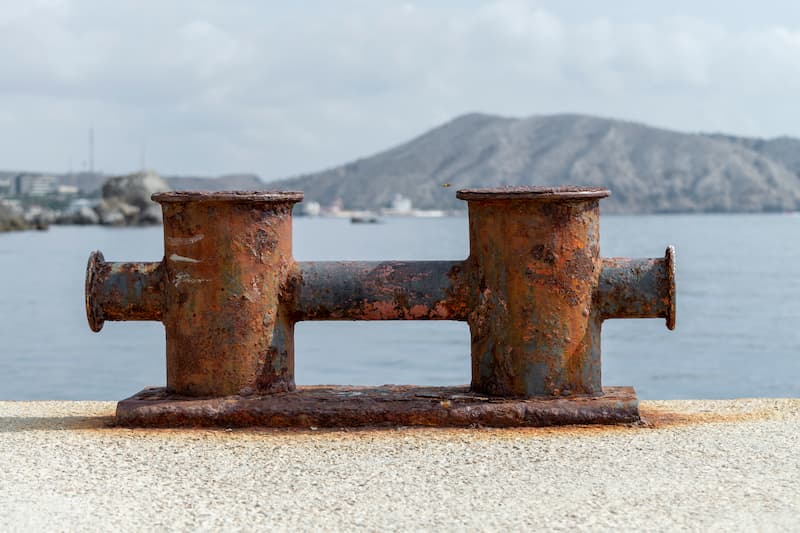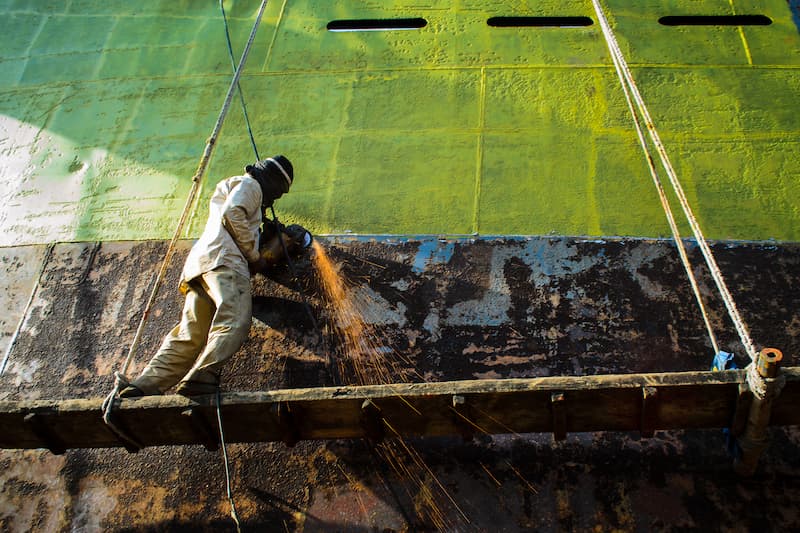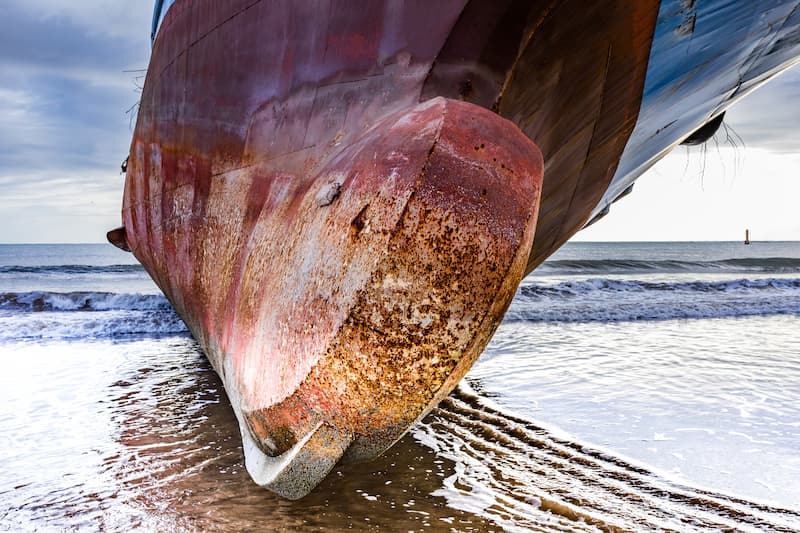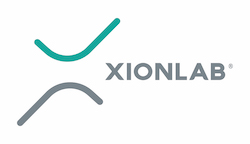No products in the cart.
Marine Corrosion Protection and Treatment: Best Rust Coating and Inhibitor Solutions for Boats in Marine Environments
October 11, 2024
By Xion Lab
October 11, 2024
By Xion Lab
Rust and corrosion pose a significant challenge in marine environments, where metal surfaces are continuously exposed to moisture, salt water, and oxidation. Without proper protection to prevent corrosion, metal parts of boats, marine vessels, and offshore structures can deteriorate, affecting their durability and safety. Corrosion and rust can lead to the accumulation of deposit and further degrade the metal. In such settings, applying a lubricant helps to displace moisture, reducing the risk of rust formation. Proper maintenance and the use of the right treatments are essential for ensuring the long-term protection of metal surfaces in harsh marine conditions.
The primary cause of rust and corrosion in marine environments is the constant exposure to saltwater and humidity. Saltwater acts as a catalyst for rust by speeding up the oxidation process that occurs when metal surfaces come into contact with oxygen and moisture. Salt ions penetrate the carbon steel or other metals, causing them to corrode faster than they would in non-salty environments. This is particularly problematic in areas with high humidity, where moisture consistently lingers on metal surfaces, promoting rust. To protect your boat from rust, using methods such as cathodic protection, rust preventative products, and proper lubrication is essential. Many products for marine applications are designed specifically to prevent rust on various types of marine metals and substrates.

Corrosion in marine settings doesn’t just affect the surface; it weakens the entire metal surface, compromising the structural integrity of boats and marine vessels. Over time, marine corrosion can eat away at essential components like motors, hulls, and propellers, leading to expensive repairs or replacements if left untreated. Implementing proper marine service and regular maintenance, including rust prevention measures, is crucial for extending the life of these critical parts.
Different types of corrosion can affect metal structures in marine environments, each with varying levels of severity. Galvanic corrosion occurs when two different types of metal come into contact in a corrosive environment, such as saltwater. This type of corrosion is common in marine vessels where aluminum, steel, and other metals are used together.
Abrasion corrosion happens when the constant movement of water or contact with rough surfaces causes the metal to wear down and corrode. Over time, these factors degrade the protective layer of the metal, leaving it vulnerable to rust. Oxide layers also form as a result of this process, accelerating the metal’s deterioration. Understanding these different types of corrosion is crucial for implementing effective marine corrosion protection measures.
For boats and other marine vessels, rust and corrosion are more than just cosmetic issues. Marine corrosion can quickly damage key components such as the hull, engine, and metal parts, leading to operational inefficiencies and costly repairs. In severe cases, rust can compromise the overall safety of the vessel, especially if the metal surface or structural components weaken due to prolonged exposure to saltwater and corrosive environments.
Without proper corrosion protection, even high-quality metal surfaces used in marine applications can degrade over time, reducing the longevity of the vessel and increasing maintenance costs. The marine industry relies on durable and resistant materials, but even the best metals can succumb to corrosion if not treated with preventative measures.
Implementing effective rust prevention strategies is essential for ensuring the long-term durability of marine vessels. By using corrosion-resistant coatings and materials, boat owners can prevent rust from taking hold in the first place. Applying protective coatings, such as epoxy paint or marine-grade paints, adds a barrier that shields the metal from exposure to saltwater and other corrosive elements.
In addition to coating solutions, regular maintenance and the application of rust inhibitors help combat rust and corrosion. Long-term protection strategies include using marine products designed specifically for harsh environments, ensuring that metal components remain rust-free for as long as possible.
When rust has already begun to develop on metal surfaces, it’s important to act quickly to remove rust and prevent further damage. Various rust inhibitors and rust removal products are available, such as Rustoleum and WD-40, which work to eliminate rust and create a protective barrier on the treated surface. For larger projects, products like Xionlab rust converter is highly effective for treating marine corrosion on boats and offshore structures.

For the best results, surfaces should be cleaned thoroughly to remove any loose rust before applying these products. Spray options are available for hard-to-reach areas, while paint-on rust inhibitors provide more targeted treatment for specific spots. These products help to prevent rust from spreading and ensure the metal surface is properly prepared for further rust prevention treatments.
Applying a protective coating after removing rust is crucial for preventing future corrosion. Epoxy paint and marine-grade coatings are popular options for their heavy-duty and abrasion-resistant properties. These coatings form a durable barrier that protects metal parts from rust caused by saltwater exposure.
In addition to paint, applying rust inhibitors like sacrificial anodes is a common practice in the marine industry. These anodes are designed to corrode in place of the boat’s metal surfaces, thereby extending the lifespan of key components like propellers and hulls. The use of multiple layers of paint and marine products adds extra protection, ensuring the metal remains shielded from the harsh marine environment.
Selecting the best marine rust treatment involves assessing the size of your boat, the materials used, and the level of exposure to saltwater. For smaller boats that are occasionally exposed to corrosive environments, a spray treatment may suffice. However, for larger vessels or those frequently in offshore environments, using high-performance marine coatings is essential.
Choosing the right corrosion protection for your boat also means considering the specific areas most vulnerable to rust, such as the hull, motor, and exposed metal parts. Products that offer protection against rust and corrosion resistance are key to maintaining the integrity of your vessel.
In addition to protective coatings, using corrosion inhibitors provides an added layer of defense against marine corrosion. These inhibitors work by forming a protective film over the metal, slowing down the rusting process and extending the lifespan of your boat’s components. Regularly applying corrosion control products designed for marine applications is crucial for keeping rust at bay.
For long-lasting results, focus on applying inhibitors to areas that are regularly submerged in water or frequently exposed to salt, as these are the most prone to rust and corrosion. Implementing these steps can significantly reduce the risk of rust development, preserving the value and functionality of your boat.

There are several highly effective products on the market for rust prevention in marine environments. Xionlab rust converter is some of the most trusted names for protecting metal surfaces from corrosion. These products can be applied to various metal components of marine vessels and are specifically designed to withstand the harsh conditions of saltwater and abrasion.
Other essential products include sacrificial anodes and marine-grade spray paint for extra protection. These tools help keep your boat rust-free and protect it from the wear and tear of marine and offshore conditions. Selecting the best marine products ensures that your vessel remains in top condition, even when exposed to corrosive environments.
Properly applying a protective coating is key to achieving rust-free results on marine vessels. Before applying any marine-grade coatings, ensure that the surface is thoroughly cleaned and rust-free. Apply the coating in multiple thin layers to achieve the best coverage and ensure that each layer dries before adding the next.
High-quality products like Xionlab rust converter provide excellent corrosion protection and are easy to apply, even for large surfaces like boat hulls. These coatings not only protect the metal from future rust but also improve the appearance and overall durability of the vessel.
One of the most common mistakes people make when applying rust treatment is skipping the crucial step of surface preparation. Failing to remove dirt, grease, and loose rust from the metal surface can prevent the protective coating from adhering properly, reducing its effectiveness. Proper surface prep is vital for ensuring protection and durability.
Choosing the right coating for marine applications is essential for achieving long-lasting results. Using non-marine-grade paints or products that aren’t designed for saltwater exposure can lead to rust forming underneath the coating, compromising the metal’s integrity. Make sure to use coatings specifically formulated for marine environments to ensure effective protection.
When looking for the best rust treatment in severe marine environments, the ideal solution typically involves a combination of rust remover, anti-corrosion coatings, and corrosion inhibitors. Products like POR-15 and Rustoleum are known for their ability to provide superior protection in marine applications. Using a water-based or ASTM-approved coating ensures the best protection for vessels and structures exposed to the harsh elements of saltwater and brackish conditions. Regular use of these products helps to prevent the formation of rust and control major causes of corrosion.
To effectively prevent rust on your boat in saltwater, it’s important to apply anti-corrosion coatings designed for marine environments. Using water-based or epoxy coatings will offer resistant to corrosion surfaces that protect metal components. Regularly applying corrosion inhibitors and ensuring protection and lubrication of key areas are essential steps. It’s also recommended to treat porous or exposed surfaces that are frequently exposed to the elements, and apply rust-resistant products to ensure superior protection for your boat.
For vessels exposed to the harsh conditions of saltwater and brackish water, it’s recommended to apply rust protection and maintenance coatings at least once a year. In areas prone to severe marine corrosion or for vessels operating in harsh marine environments, more frequent applications may be necessary. Depending on the metal surfaces and structures, and the coating applied, the frequency of reapplication may vary. Products like POR-15 and Rustoleum often provide long-lasting results, though regular maintenance is key to avoiding corrosion problems in vessels and structures exposed to these conditions.
Protecting marine vessels from rust and corrosion requires a combination of preventative maintenance, high-quality rust inhibitors, and the use of marine-grade coatings. By following these best practices, boat owners can ensure long-term durability and minimize the effects of rust on their vessels, even in the harshest marine environments.
